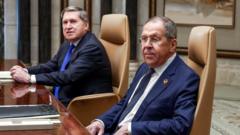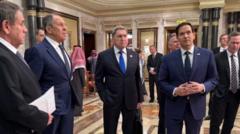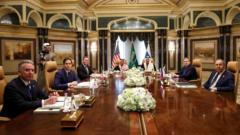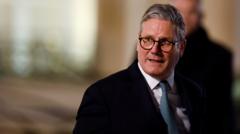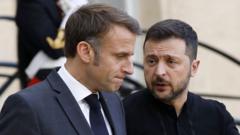**President Zelensky confronts fresh challenges in rallying support from the West amidst new negotiations between Trump and Putin.**
**New Dynamics for Zelensky as Trump Reengages Putin**
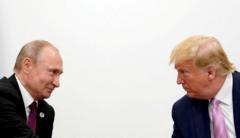
**New Dynamics for Zelensky as Trump Reengages Putin**
**Analysis of the shifting geopolitical landscape following Trump's recent talks with Putin.**
In a significant political shift, President Volodymyr Zelensky of Ukraine finds himself grappling with a new reality as former President Donald Trump takes a more conciliatory approach toward Russia, particularly following Trump's recent phone call with President Vladimir Putin. This has raised concerns among allies, as they navigate what appears to be a more unpredictable geopolitical climate.
Trump's unexpected outreach to Putin, which included an extensive 90-minute conversation potentially leading to a meeting in Saudi Arabia, signals a stark change in the American approach to the ongoing conflict in Ukraine. Zelensky expressed his discomfort with being relegated to a secondary role in discussions that could determine Ukraine's fate, asserting his country’s need for participation in any negotiations regarding its future.
Following the call with Putin, Zelensky was contacted by Trump, who seems to subordinate Ukraine's position relative to Russia's during peace talks. "It's not pleasant," Zelensky remarked, making it clear that he opposes any agreements made without Ukraine’s involvement, insisting that the narrative should not be dictated by Putin. This scenario is compounded by Zelensky's urgent participation in the Munich Security Conference, where he will be confronted with American skepticism regarding Ukraine's prospects against the backdrop of the war.
Meanwhile, the European Union also recognizes the need for a united front, as the EU's foreign policy chief, Kaja Kallas, emphasized strengthening Ukraine while insisting on a prominent European role in negotiations. However, Zelensky is acutely aware that despite the EU’s financial backing, U.S. military power remains crucial for Ukraine's defense strategy, rendering American support indispensable.
Trump, meanwhile, has positioned himself as a potential mediator promising peace, which could be viewed favorably by Putin. He has publicly made statements that suggest legitimacy for Russia’s territorial claims while sidelining Ukrainian concerns, indicating a shift in U.S. foreign policy that may leave Zelensky and his supporters more vulnerable than before.
The potential for a diluted peace deal looms as Trump appears content to entertain Russian demands, which include compromises on territorial integrity and Ukraine's NATO aspirations. Critics of Trump have raised alarms about the possibility of making concessions prematurely in negotiations, drawing historical parallels to appeasement strategies that have not ended well.
Zelensky stands at a pivotal juncture with increased challenges, facing a not-so-distant past of hardships that followed the Russian invasion in 2022. His leadership will be tested as Western allies must reconcile their military commitments with practical realities, sparking a moment of decision that can no longer be postponed under the new dynamics of international relations dictated by Trump’s recent strategic moves.
With a tense situation at hand, the future of Ukraine hangs in a delicate balance as Zelensky seeks to navigate this newly complex geopolitical terrain while ensuring that Ukraine's sovereignty remains protected and its territorial integrity preserved against potential concessions that may emerge from renewed negotiations.
Trump's unexpected outreach to Putin, which included an extensive 90-minute conversation potentially leading to a meeting in Saudi Arabia, signals a stark change in the American approach to the ongoing conflict in Ukraine. Zelensky expressed his discomfort with being relegated to a secondary role in discussions that could determine Ukraine's fate, asserting his country’s need for participation in any negotiations regarding its future.
Following the call with Putin, Zelensky was contacted by Trump, who seems to subordinate Ukraine's position relative to Russia's during peace talks. "It's not pleasant," Zelensky remarked, making it clear that he opposes any agreements made without Ukraine’s involvement, insisting that the narrative should not be dictated by Putin. This scenario is compounded by Zelensky's urgent participation in the Munich Security Conference, where he will be confronted with American skepticism regarding Ukraine's prospects against the backdrop of the war.
Meanwhile, the European Union also recognizes the need for a united front, as the EU's foreign policy chief, Kaja Kallas, emphasized strengthening Ukraine while insisting on a prominent European role in negotiations. However, Zelensky is acutely aware that despite the EU’s financial backing, U.S. military power remains crucial for Ukraine's defense strategy, rendering American support indispensable.
Trump, meanwhile, has positioned himself as a potential mediator promising peace, which could be viewed favorably by Putin. He has publicly made statements that suggest legitimacy for Russia’s territorial claims while sidelining Ukrainian concerns, indicating a shift in U.S. foreign policy that may leave Zelensky and his supporters more vulnerable than before.
The potential for a diluted peace deal looms as Trump appears content to entertain Russian demands, which include compromises on territorial integrity and Ukraine's NATO aspirations. Critics of Trump have raised alarms about the possibility of making concessions prematurely in negotiations, drawing historical parallels to appeasement strategies that have not ended well.
Zelensky stands at a pivotal juncture with increased challenges, facing a not-so-distant past of hardships that followed the Russian invasion in 2022. His leadership will be tested as Western allies must reconcile their military commitments with practical realities, sparking a moment of decision that can no longer be postponed under the new dynamics of international relations dictated by Trump’s recent strategic moves.
With a tense situation at hand, the future of Ukraine hangs in a delicate balance as Zelensky seeks to navigate this newly complex geopolitical terrain while ensuring that Ukraine's sovereignty remains protected and its territorial integrity preserved against potential concessions that may emerge from renewed negotiations.




